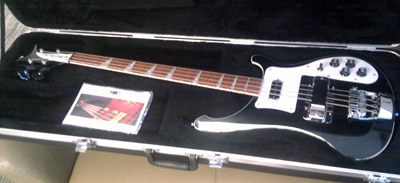August 31, 2011
Bass Check

Last week I achieved a goal that I've had for seven years, one that's even documented back in the earliest days of this blog: I bought a Jetglo Rickenbacker 4003 bass. Bass Northwest may have one of the world's most hideous store websites, but they delivered where it counts. And while I was there, putting my name on the list to get this bass, they told me an interesting story.
Rickenbacker only makes fifty basses a year, they said, and those basses are made in what (from a store's perspective, not Rickenbacker's) is essentially a random order. The company doesn't tell stores what color or type they're making on any given day, or when they can expect an item to arrive. Instead, a store will just get a note from the Rick factory in response to their standing order, letting them know that an instrument is on the way. You might think that this unpredictability would make it difficult for stores to sell these basses, but in fact the extreme rarity of Rickenbackers (not to mention the voracity of their fanbase) means that they find homes almost immediately.
Why does the Rickenbacker company make so few instruments each year? I don't know the exact reason, but I suspect it has a lot to do with it being a family-owned business--one that's extremely possessive of their designs (Ric is notoriously litigious towards "generic" versions of its guitars) and therefore still builds everything here, where they can retain close control. The management at Ric is obviously really proud of their domestic manufacturing. Each bass comes with a little "made in USA" sticker on the pickguard, which (on a black and white instrument) makes it look a bit like it's wearing a flag pin on its lapel. I almost expect it to run for office.
For whatever reason they've chosen to do it, Rickenbacker's stubborn refusal to move production overseas stands out. Practically nothing else that I own is built here, musical or otherwise. It's possible that a lot of things can't be produced domestically anymore: the New York Times had an article the other day on bringing manufacturing back to the US, and the difficulty of reviving an industry after so much of the skills and infrastructure supporting it have been outsourced. It turns out that manufacturing, which would seem like a largely solved problem, really isn't--and it's not easy to catch up if we fall behind.
Stop me if I get too Friedman-esque, but for me, seeing that little flag sticker on my new bass highlights a tremendous tension in today's globalized marketplace. I think Rickenbackers are probably designed better than instruments built overseas (they'd have to be, since there's no economy of scale to subsidized waste) and I like that their manufacturing is subject to our regulation. But the irony is that I might not have learned to play bass if everything was made like (and cost as much as) a Rickenbacker. My first bass, which I still own and play, was a $300 factory-made Yamaha BB404 from Taiwan.
So I'm trying not to be incredibly snobby about where my new bass is made, because I owe my ability to play it to cheap construction. Simultaneously, though, I think there's a lot of value in Rickenbacker's model, and I wish we did more to encourage domestic production--not out of jingoism, but as a way to keep our skills sharp and our products humane. Maybe that's a lot of baggage to lay on a single bass, but I've been waiting seven years for it, after all: I think it might be forgiveable to obsess a little.

